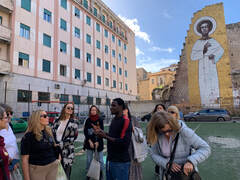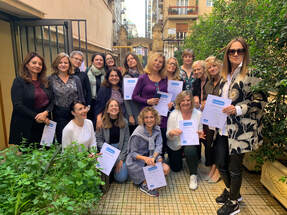|
Schools and educational programmes today welcome students with a wide range of socio-cultural backgrounds. One of the major challenges for educators is to support the learners as they adapt to a different cultural setting while also serving as a role model for critical thinking and an open mindness, valuing and celebrating diversity rather than rejecting it. The new session of the course “Intercultural learning and cultural diversity in the classroom” took place in Palermo from 20/11/2022 to 26/11/2022. The participants came from different countries of Europe, with Jelena, Sanja and Emina from Desanka Maksimovic Primary School, Zajecar, Serbia; Stella from Stavanger Offshore Technical College, Norway; Triona, Sile, Mary and Patricia from Limerick and Clare Education and Training Board, Ireland; Susana and Carmen from IES El Parador, Spain; Zrinka and Anita from Osnovna škola Šime Budinića Zadar, Croatia; Vasiliki and Eleni from 2nd GEL KORYDALLOU, Greece; and Anna and Natālija from Liepaja Liedaga secondary school, Latvia. The course started with a brainstorming on what culture is and what intercultural learning means for all the participants. As a first step to look at diversity, we explored the concept of identity. Ss a result of different activities, our participants considered their own identities and values and how those identities relate to culture and experience. Then, we focused on prejudices, stereotypes and discrimination. Altogether we discovered the meaning of the vicious cycle of stereotypes. The participants were invited to reflect about how stereotypes can convert into prejudices and discrimination, generating a vicious cycle that strengthens stereotypes and lead them to action. Thanks to an inspirational TED Talk we saw, we learned that if we “Show people as one thing — as only one thing — over and over again, that is what they become."  Inclusion was the last topic we worked on. First, participants took part in simulation exercises to recognise and analyse the difficulties and potentialities of intercultural communication. These exercises might assist students in challenging common assumptions and considering potential connections between cultures. Then, other activities were implemented to focus on the role of empathy and active listening in creating an inclusive classroom. Through other group activities, the participants had the chance to experience the importance of membership and the feeling to be part of a group. As part of the training course, our participants had the chance to visit a local institution active in the field of multiculturalism, which offers value to the city starting from (and thanks to) cultural diversity. They were thus given the chance to see Palermo through different eyes, increasing their eagerness and interest to use what they have learned during the week while exploring the city and interacting with the locals. Discover more about this course in: https://www.erasmustrainingcourses.com/diversity-and-intercultural-learning-in-the-classroom.htm
|
Welcome to the ELA Blog. Here you will find articles and photos of our courses and have a look at the topics addressed during the week in Bologna, Palermo and Tenerife. You will also have the chance to take a peek at our projects and check out what we have been up to.
Archives
July 2024
Categories |
-
Course catalogue
- 2023-2024 course catalogue
- Soft Skills >
- ICT and New Technologies >
- Inclusion and Diversity >
-
Innovative Teaching Methods
>
- Innovative teaching methods discovery
- Non-formal education teaching methods
- Dual education and work-based learning
- Teaching leadership and entrepreneurship
- Project based learning
- Game based learning and gamification
- Green skills
- Outdoor education
- Outdoor education trekking edition
- Promoting creativity and critical thinking
- Languages and EU projects >
- Preschool >
- Erasmus Plus KA1
- What we do
- About us
- Locations
- Blog
- Contact us
 English
English български
български Čeština
Čeština Español
Español Français
Français ελληνικά
ελληνικά Italiano
Italiano Polski
Polski Português
Português Română
Română






 RSS Feed
RSS Feed









